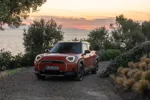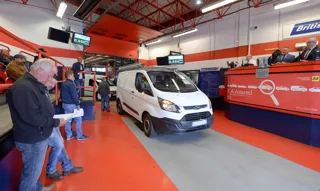
Author: Andy Picton, chief commercial vehicle editor, Glass’s (pictured)
The light commercial vehicle (LCV) sector is proving resilient in these challenging times, however, there is still much to contend with as we move into the last quarter of 2020.
From new social distancing measures, redundancies, the end of the furlough scheme and of course Brexit, all will have an effect on the LCV market and the wider economy.
The new plate month of September is typically a strong month, this year returning an encouraging 26.4% growth in demand for LCVs.
Overall, 52,096 new LCVs hit UK roads during the month, as all sectors bar-one returned increases in registrations.
 The first three quarters of 2020 have seen year-to-date registrations decline by 27.4%, with 208,080 units hitting UK roads (286,616 units – 2019).
The first three quarters of 2020 have seen year-to-date registrations decline by 27.4%, with 208,080 units hitting UK roads (286,616 units – 2019).
Breaking the month down by sectors reveals that registrations for pickups, vans between 2.0-2.5 tonnes and vans between 2.5-3.5 tonnes increased by 10.9%, 11.6% and 40.9% respectively.
A 2.5% decline for vans under 2.0 tonnes was the only disappointment.
It is important to note that these increases are set against a backdrop of a weak September 2019 driven by the introduction of WLTP for LCVs, with September 2020 registrations still 3.3% down on 2018.
Top five LCV registrations
|
Year to date 2020 |
|
Sept 2020 |
|
Sept 2019 |
|
|
Ford Transit Custom |
30,392 |
Ford Transit Custom |
8,437 |
Ford Transit Custom |
5,653 |
|
Mercedes-Benz Sprinter |
16,521 |
Ford Transit |
3,764 |
Vauxhall Vivaro |
2,827 |
|
Ford Transit |
15,224 |
Ford Ranger |
3,744 |
Ford Ranger |
2,377 |
|
Vauxhall Vivaro |
10,746 |
Volkswagen Transporter |
2,937 |
Peugeot Partner |
2,350 |
|
Volkswagen Transporter |
10,612 |
Vauxhall Vivaro |
2,825 |
Ford Transit Connect |
2,304 |
For quarter three 2020, the current SMMT LCV registration forecast is down 26.3% to 269,000 units.
With the final forecast for 2020 due at the end of October, it is, unfortunately, unlikely to show any improvement over the current forecast.
As we move into October, UK registrations remain nearly 30% down on the same point last year.
The pandemic continues to affect many businesses with the stop-start nature of localised lockdowns affecting many towns and cities around the UK.
Although September was a positive step in the right direction, it will remain a tall order to meet the current SMMT forecast.
The interconnected nature of the UK economy means that the unknown nature of Brexit and the end of the furlough scheme will bring further uncertainty in the coming months.
Moving forward, operators are starting to look more seriously at more environmentally friendly technologies to meet fleet requirements.
This will be critical in the crucial role light commercial vehicles play in the UK economy.
September used light commercial vehicle (LCV) overview
The used LCV market continued to deliver outstanding performance during September, with weakness seen only in the minibus sector due to passenger movement restrictions.
Stock shortages driven partly by fewer de-fleets, economic uncertainty and increased demand for used LCVs was the catalyst for the strong month, along with uncertainty over future vehicle supplies.
Pent up demand and the volatile world that we currently live in, means that prices are likely to remain high for some time to come.
There seems to be no better time to sell an LCV, with dealers enjoying a buoyant retail market and healthy profits as a result.
Rental demand is also high supporting increased home deliveries, with some vehicles earmarked for auction, actually being re-fleeted to meet demand.
This trend is likely to increase in the run-up to Christmas.
September in detail
Glass’s auction data results show the overall number of LCV sales in September was up 15.9% versus August 2020 and up a staggering 57.4% versus September 2019.
First-time conversions were down slightly at 87.4% compared to 88.0% in August, but up 9.0% versus September last year.
There is a continued appetite for good quality stock requiring the minimum of retail preparation across all ages.
Supporting this enthusiasm is the continued high number of online buyers reported by the auction houses.
Since March this year, average sales prices have risen over 30%, with September alone recording an 8.3% increase versus August and a 31.2% increase on the same point last year.
September prices were at the highest level for the last twelve months.
The average age of sold stock dropped from 72.4 months in August to 69.7 months in September.
This figure was 0.9 months higher than the same point last year.
Average mileage for sold vehicles dropped from 73,634 miles in August to 70,457 miles in September.
This is the lowest average mileage recorded in the last twelve months and over 10,000 miles less than at the same point last year.
Glass’s continues to monitor the LCV market closely and has an open dialogue with auction houses and manufacturers, leasing and rental companies, independent traders and dealers as well as the main industry bodies.
This information, combined with the wealth of knowledge in our CV team ensures Glass’s valuations remain relevant in the market place.



















Login to comment
Comments
No comments have been made yet.